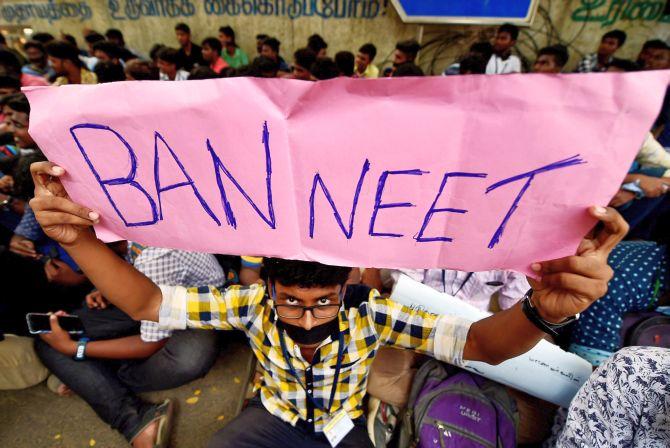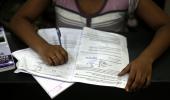Data from Tamil Nadu indicated that NEET likely favours CBSE students.
CBSE students took every third seat available in government medical colleges in the state.

Of the 3,534 students admitted to various government medical colleges in the current academic year in Tamil Nadu, 1,224 (34 per cent) belonged to the Central Board of Secondary Education, CBSE.
The remaining two-thirds (66 per cent) came from schools under the Tamil Nadu state board, registering a sharp decline from the previous year, when around 99 per cent students from the state board were given admission in medical colleges.
This dip is attributed to the National Eligibility and Entrance Test, NEET, a centralised common medical entrance exam, which was conducted for the first time in Tamil Nadu along with other states this year.
Till last year, the students were given admission to government medical colleges purely on the (basis of) marks obtained by them in Class 12 exams.
Private colleges admitted students who could afford steep fees, even if they failed to make it on merit.
S Anitha, a 17-year-old girl who committed suicide after failing to secure admission, was considered a meritorious student in school.
Anitha had secured 1,176 marks out of 1,200 in Class 12. But her score in NEET was 86 out of 720.
She would have got admission into a medical college had NEET not been implemented in the state following the directions of the Supreme Court.
Though the jury is still out on the intended outcomes of NEET, including curbing corrupt practices in private medical colleges and bringing medical education on par, students and political parties in Tamil Nadu have not stopped protesting.
Data from Tamil Nadu government would perhaps indicate that NEET favours CBSE students.
Of the 88,431 students who appeared for the exam from Tamil Nadu, around 4,675 belonged to 580 CBSE schools in Tamil Nadu.
These CBSE students could bag at least 1,224 medical seats.
In other words, they took every third seat available in the government medical colleges.
The perception is that NEET is largely based on CBSE curriculum, even as CBSE-affiliated schools (19,316) are only a fraction of the total (1,516,865) schools in the country.
Of the 19,316 CBSE schools across the country, 1,118 are Kendriya Vidyalayas (Central Schools).
The others include 2,734 government aided, 590 Jawahar Navodaya Vidyalayas, 14 Central Tibetan Schools.
These schools are considered to be premier because of the quality of education and their presence in the urban areas.
"The NEET exam is based on core curriculum of the CBSE and other states board. But still, there is a wide variation among the curriculums of various state boards and also the CBSE. Unless the state boards align their curriculum to the national curriculum, students from other school boards would keep feeling that they are at a disadvantage," says former CBSE chairman Ashok Ganguly.
"The efforts should be made to remove this psyche barriers," adds Ganguly, who in the past has made efforts to make common curriculum for the science subjects throughout the country.
"Somebody should also place the ground situation before the Supreme Court," Ganguly said.
It was the apex court's decision which cleared the way for implementation of NEET across the country.
While Tamil Nadu tried to delay the process through an ordinance, it was struck down by the Supreme Court.
An official in the National Democratic Alliance government said that designing a common course curriculum, course transactions and evaluation practices in the country was easier said than done.
"Our system is unique and we have 30 different state governments. Any effort to make common curriculum would be seen as an attempt by the Centre to infringe on the rights of the states. It is a call which the political parties and the central leadership will have to take," he said.
Data also suggest that of the 2,314 state board students who got admissions in Tamil Nadu medical colleges, 2,309 were from private schools whereas 0.14 per cent studied in government schools.
Add to that the fact that students in urban cities attend private schools in much larger numbers than in rural areas.
Critics believe that this would further widen the divide between the urban and rural students in government medical colleges, forcing many to go for the mushrooming coaching industry.
"While the NEET will benefit by and large, coaching institutes will try to cash in on this situation," admits Giridhar Gyani, director, Association of Healthcare Providers.
The Tamil Nadu government has taken note of this and decided to set up special coaching centres in the state.
Minister for School Education K A Sengottaiyan said the government would open 412 coaching centres to train students for NEET.
"The teaching quality in schools will be improved and students will be coached to the extent that there will be no more deaths owing to NEET," the minister said, adding that special resource persons would be brought in from Rajasthan, Delhi and Andhra Pradesh during the weekend to coach students through video-conferencing.
This would help students access sessions over Skype, Sengottaiyan said.
The state government also has plans to set up smart classrooms at a cost of Rs 60 crore (Rs 600 million) in schools across the state.
But there are many who believe that NEET is the only way forward, as it ends corruption in private medical colleges and students don't have to appear for multiple entrance exams.
"NEET is only doing students good, as it has reduced paid seats in medical education. Earlier, students were booking their medical seats two or three years in advance. NEET has rendered it impossible," Gulshan Garg, chairman, Sankalp Charitable Trust, said.
However, the roll-out of NEET has been far from smooth.
IMAGE: Loyola College students in Chennai protest, demanding justice for Anitha, the 17 year old who committed suicide over NEET, also urging the central government to ban NEET. Photograph: R Senthil Kumar/PTI Photo












 © 2025
© 2025